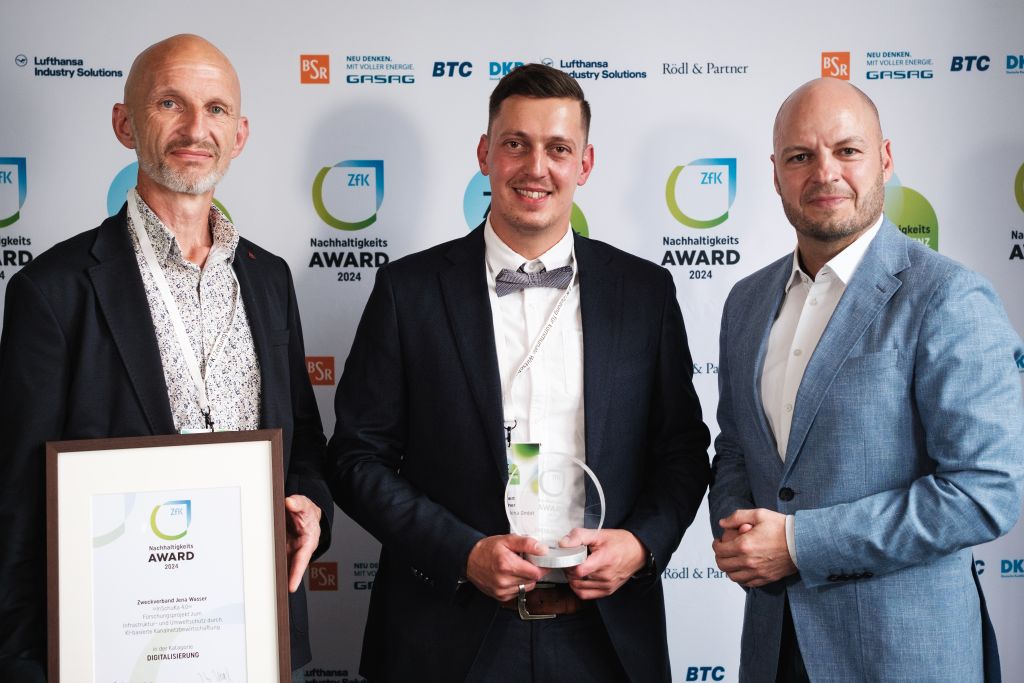Climate change and extreme weather conditions pose major challenges for water management. As part of the InSchuKa research project, the JenaWasser special-purpose association is developing intelligent digital solutions in collaboration with Hof University of Applied Sciences, among others. The project partners want to develop a data collection, analysis and control system that allows reliable predictions to be made about the future load on the sewer networks. This can provide sewer network operators with valuable information for resilient sewer operation, the prevention of water pollution and future construction measures, among other things. The project has now been awarded the "Sustainability AWARD" in Berlin by the Zeitung für kommunale Wirtschaft (ZfK) in the digitalisation category.

As part of InSchuKa, Jena's main wastewater collectors are to be equipped with flexible, AI-controlled sewer flaps by the end of the year. These regulate the transport volume in the sewer fully automatically - based on current sewer measurement values and weather forecasts. This prevents sewer flooding in the event of heavy rainfall and reduces foul-smelling deposits during prolonged dry spells.
InSchuKa is a project to digitalise sewer network control with the help of artificial intelligence. The technology is being tested in the so-called main collector, the largest sewer in Jena, which runs for around eight kilometres right across Jena. It collects a large proportion of the city's wastewater and transports it to the city's central sewage treatment plant.
Digitally controllable butterfly valves
The aim is now to equip the duct, which has a diameter of up to 3 metres, with flexible butterfly valves. These are to be digitally controllable and can be closed or opened as required.
With the help of these flaps
- the discharge of water from the main collector is accelerated or delayed
- the channel volume can be used as retention space or released in a targeted manner
- the waste water is "dammed up" over a certain period of time and drained off in a surge, which cleans the sewer walls of harmful deposits
- the inflow to the wastewater treatment plant can be made more uniform and therefore more efficient
The innovation: Artificial intelligence is used to determine the optimum setting for the existing butterfly valves in each situation. The calculations are based on existing sewer network simulations, real-time measured values from the sewer and available weather forecasts, in particular for expected rainfall.
The project team is currently working on "feeding" the digital platform with a data basis. Among other things, drone images of the main wastewater collector were taken and a three-dimensional "digital twin" of the sewer and its ancillary facilities was created using infrared measurements. This now forms the basis for calculations and simulations. Based on these values, the required number and possible locations for the flexible butterfly valves were determined.
The current plan is to initially install two butterfly valves: One directly at the end of the main collector just before the inflow to the central sewage treatment plant in Zwätzen and one roughly in the middle, in the area of the so-called Landfeste. Project planning and production are currently underway for the purchase and installation of the sewer valves, with installation scheduled to start in late summer.
Project partners and funding
In the InSchuKa 4.0 project ("Combined infrastructure and environmental protection through AI-based sewer network management"), the JenaWasser special-purpose association is working together with the universities of Hof and Magdeburg-Stendal. Three companies from the fields of measurement technology, automation and digitalisation are also involved in the project, which is funded by the Federal Ministry of Education and Research: HST Systemtechnik GmbH, Pegasys GmbH and Nivus GmbH. The project volume for the JenaWasser part of the project totals 925,000 euros, of which 650,000 euros is funded by the Federal Ministry of Education and Research.
